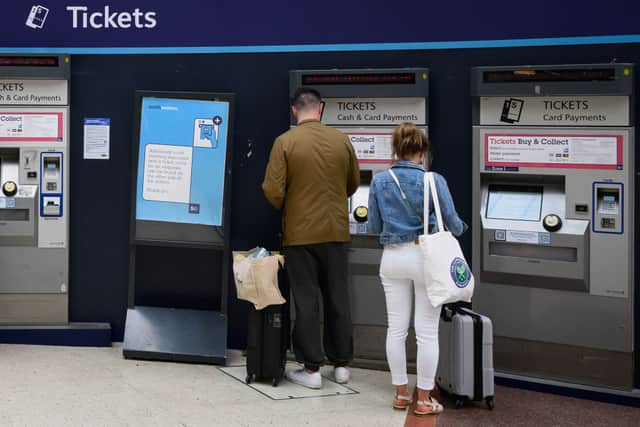Rail ticket office closures: Plans to shut hundreds of railway ticket offices have been cancelled
and live on Freeview channel 276
Plans to close hundreds of station ticket offices across England over the next three years have been cancelled, the Department for Transport (DfT) has announced.
This comes after passenger watchdog groups objected to the proposals, which would see ticket office staff be transitioned to “customer help” roles, giving advice and supporting customers with accessibility needs.
Advertisement
Hide AdAdvertisement
Hide AdThe plans, which were put forward by train companies in a move to cut costs, sparked concerns that the move would lead to job losses, and put some vulnerable passengers such as those who are disabled or elderly off train travel.


Transport Secretary Mark Harper said: “The consultation on ticket offices has now ended, with the government making clear to the rail industry throughout the process that any resulting proposals must meet a high threshold of serving passengers.
“We have engaged with accessibility groups throughout this process and listened carefully to passengers as well as my colleagues in Parliament. The proposals that have resulted from this process do not meet the high thresholds set by ministers, and so the government has asked train operators to withdraw their proposals.
“We will continue our work to reform our railways with the expansion of contactless Pay As You Go ticketing, making stations more accessible through our Access for All programme and £350 million funding through our Network North plan to improve accessibility at up to 100 stations.”
Advertisement
Hide AdAdvertisement
Hide AdTransport Focus and London TravelWatch said it had received 750,000 responses in total from individuals and organisations in a public consultation.
99% of the 230,000 responses London TravelWatch received were opposed to ticket office closures.
Chief Executive Michael Roberts said: “The way many passengers buy tickets is changing and so we understand the need to adapt and change with the times. But the key question for us is whether there is evidence to show that these proposals to close ticket offices represent a genuine improvement for passengers.
“The three big issues for the public arising from the consultation were how to buy tickets in future, how to get travel advice and information at stations, and how Disabled passengers can get assistance when they need it.
Advertisement
Hide AdAdvertisement
Hide Ad“Despite improving on their original proposals, we don’t think the train companies have gone far enough. We cannot say with confidence that these proposals would improve things for passengers and that is why we have objected to all 269 ticket office closures.”
The RMT union, which has been campaigning against the proposals since they were announced in July described the government’s decision as a “resounding victory” for the union’s campaign and a win for passengers, community groups and rail workers alike.
General Secretary Mick Lynch said: “We are now calling for an urgent summit with the government, train operating companies, disabled and community organisations and passenger groups to agree a different route for the rail network that guarantees the future of our ticket offices and stations staff jobs to delivers a safe, secure and accessible service that puts passengers before profit.”
Liberal Democrat London Assembly member and transport spokesperson Caroline Pidgeon AM said: “The proposed cuts to ticket offices will deeply impact elderly and vulnerable passengers across London. The scale of response to London TravelWatch’s consultation only matches what I have heard from constituents across London.
Advertisement
Hide AdAdvertisement
Hide Ad“Many Londoners will still need to speak to someone in person, whether that’s buying tickets, help if trains are delayed or cancelled or advice about how to continue their journey. It is therefore vital that major stations remain staffed from the first to last trains, to ensure that passengers can get assistance if they need it.
“The government and rail companies must now listen and rethink their plans.”
Matt Stringer, RNIB Chief Executive said: “We are delighted the voice of blind and partially sighted people has been heard, and the minister has made this change. It’s essential the experiences of people with sight loss are properly understood in decision-making. These closures would have left many blind and partially sighted people unable to live a full life: without a means to see family, go to their health appointments and play their part in our communities.
“We welcome the minister’s commitment in a meeting this morning to form a working group with a variety of organisations to ensure a better train travelling experience in the future, with accessible technology and infrastructure improvements at its heart.
Comment Guidelines
National World encourages reader discussion on our stories. User feedback, insights and back-and-forth exchanges add a rich layer of context to reporting. Please review our Community Guidelines before commenting.
